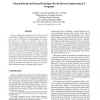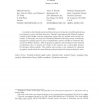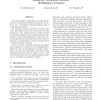758 search results - page 44 / 152 » Timing Analysis of Optimised Code |
112
click to vote
ICSM
1996
IEEE
15 years 6 months ago
1996
IEEE
Reverse engineering of program code is the process of constructing a higher level abstraction of an implementation in order to facilitate the understanding of a system that may be...
131
click to vote
GLOBECOM
2010
IEEE
15 years 9 days ago
2010
IEEE
Streaming erasure codes encode a source stream to guarantee that each source packet is recovered within a fixed delay at the receiver over a burst-erasure channel. This paper intro...
115
Voted
TIT
2010
14 years 9 months ago
2010
A variable-to-fixed length encoder partitions the source string into variable-length phrases that belong to a given and fixed dictionary. Tunstall, and independently Khodak, desig...
118
Voted
FOCS
1992
IEEE
15 years 6 months ago
1992
IEEE
The main purpose of this paper is to promote the study of computational aspects, primarily the convergence rate, of nonlinear dynamical systems from a combinatorial perspective. W...
148
click to vote
GLOBECOM
2008
IEEE
15 years 8 months ago
2008
IEEE
—Cooperative communication using rateless codes, in which the source transmits an infinite number of parity bits to the destination until the receipt of an acknowledgment, has r...



